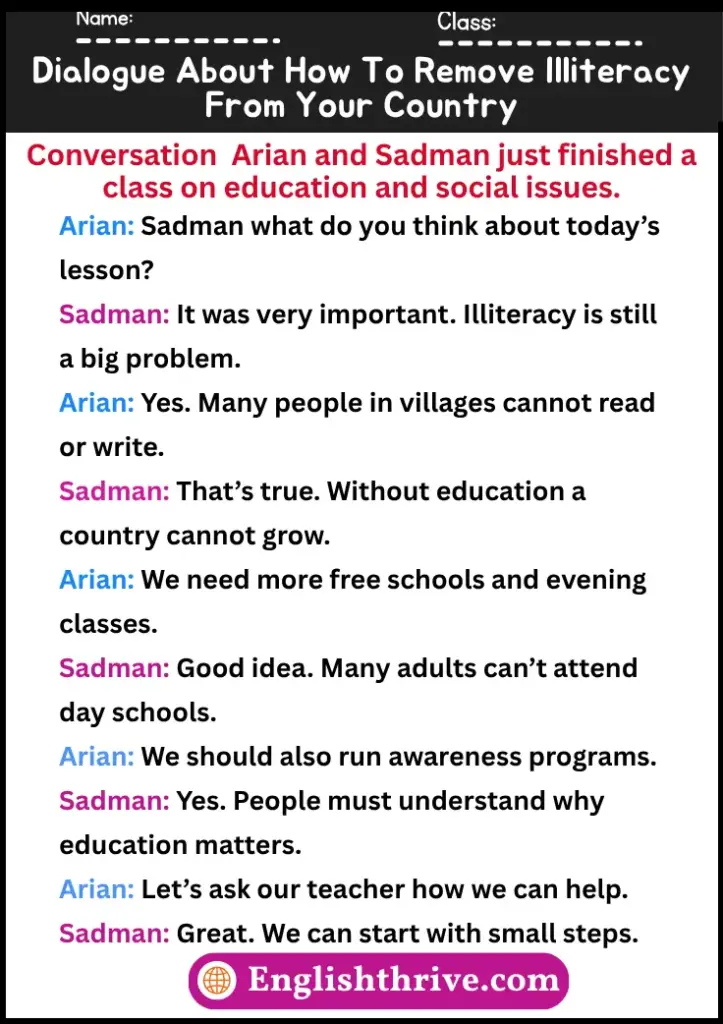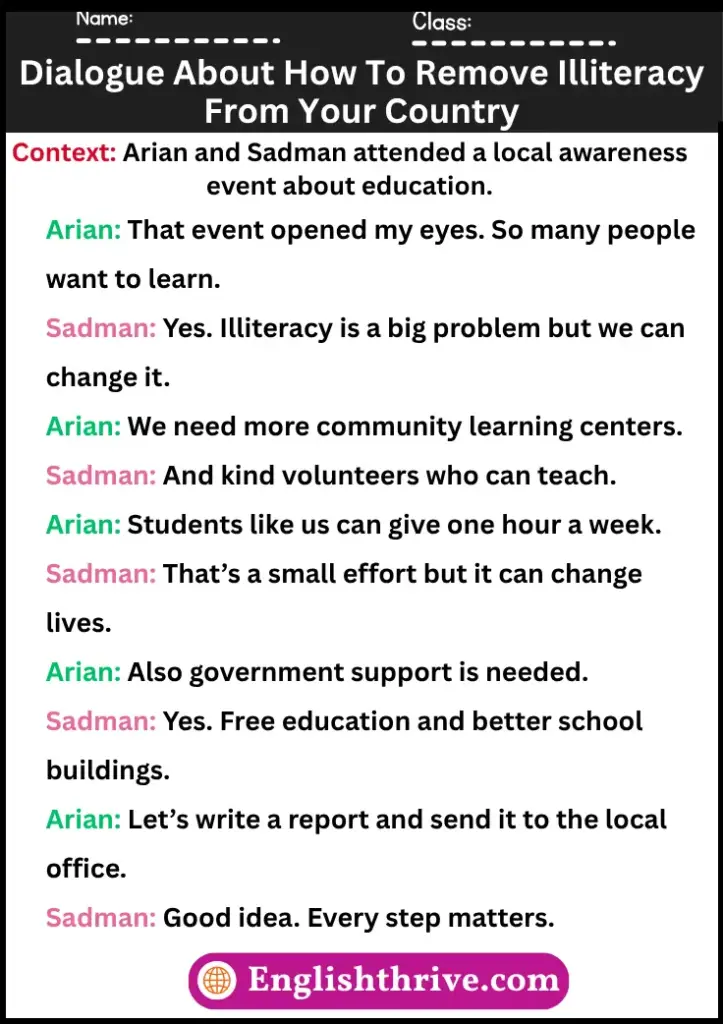Contents
ToggleSample 1: Dialogue About How To Remove Illiteracy From Your Country
Context: Arian and Sadman just finished a class on education and social issues.
Arian: Sadman what do you think about today’s lesson?
Sadman: It was very important. Illiteracy is still a big problem.
Arian: Yes. Many people in villages cannot read or write.
Sadman: That’s true. Without education a country cannot grow.
Arian: We need more free schools and evening classes.
Sadman: Good idea. Many adults can’t attend day schools.
Arian: We should also run awareness programs.
Sadman: Yes. People must understand why education matters.
Arian: Let’s ask our teacher how we can help.
Sadman: Great. We can start with small steps.

Sample 2: Dialogue About How To Remove Illiteracy From Your Country
Context: Arian and Sadman are preparing a school project on removing illiteracy.
Sadman: Arian what ideas should we include in our project?
Arian: Let’s focus on building more schools in rural areas.
Sadman: That’s good. We can also talk about training more teachers.
Arian: Yes. Many schools don’t have enough teachers.
Sadman: We should include adult education programs too.
Arian: I agree. Adults also have the right to learn.
Sadman: Can we also suggest mobile libraries?
Arian: Great idea. Books can reach more people that way.
Sadman: I’ll prepare the poster. You can write the speech.
Arian: Perfect. Let’s work hard on this.
Sample 3: Dialogue About How To Remove Illiteracy From Your Country
Context: Arian and Sadman are watching a news report about low literacy rates.
Sadman: It’s sad to see so many people still can’t read.
Arian: Yes. Illiteracy keeps people stuck in poverty.
Sadman: What can we do to help?
Arian: We can teach children in slums during weekends.
Sadman: That sounds helpful. But will they come?
Arian: If we make it fun and friendly they will.
Sadman: We can use games and pictures to teach them.
Arian: Yes. Learning should feel easy not scary.
Sadman: I want to be part of this change.
Arian: Me too. Together we can do something good.
Sample 4: Dialogue About How To Remove Illiteracy From Your Country
Context: Arian and Sadman visited a village and noticed the lack of education.
Sadman: Arian did you see that most children there don’t go to school?
Arian: Yes. It was very sad to see.
Sadman: Why does this happen?
Arian: Many parents are poor and need help at home.
Sadman: So they don’t send their kids to school?
Arian: Yes. Some don’t even know how important school is.
Sadman: We should raise awareness and offer support.
Arian: Maybe free food and books would help.
Sadman: That could bring more children to class.
Arian: Let’s tell our school about this idea.
Sadman: Good. Every child should get a chance to learn.
Sample 5: Dialogue About How To Remove Illiteracy From Your Country
Context: Arian and Sadman attended a local awareness event about education.
Arian: That event opened my eyes. So many people want to learn.
Sadman: Yes. Illiteracy is a big problem but we can change it.
Arian: We need more community learning centers.
Sadman: And kind volunteers who can teach.
Arian: Students like us can give one hour a week.
Sadman: That’s a small effort but it can change lives.
Arian: Also government support is needed.
Sadman: Yes. Free education and better school buildings.
Arian: Let’s write a report and send it to the local office.
Sadman: Good idea. Every step matters.

FAQs about Dialogue About How To Remove Illiteracy From Your Country
1. What is illiteracy?
Answer: Illiteracy means not being able to read or write. It stops people from learning and growing in life.
2. Why is removing illiteracy important?
Answer: Education helps people get jobs earn money stay healthy and make better choices. A literate society is stronger and safer.
3. How can students help reduce illiteracy?
Answer: Students can volunteer to teach others spread awareness donate books and support local learning programs.

